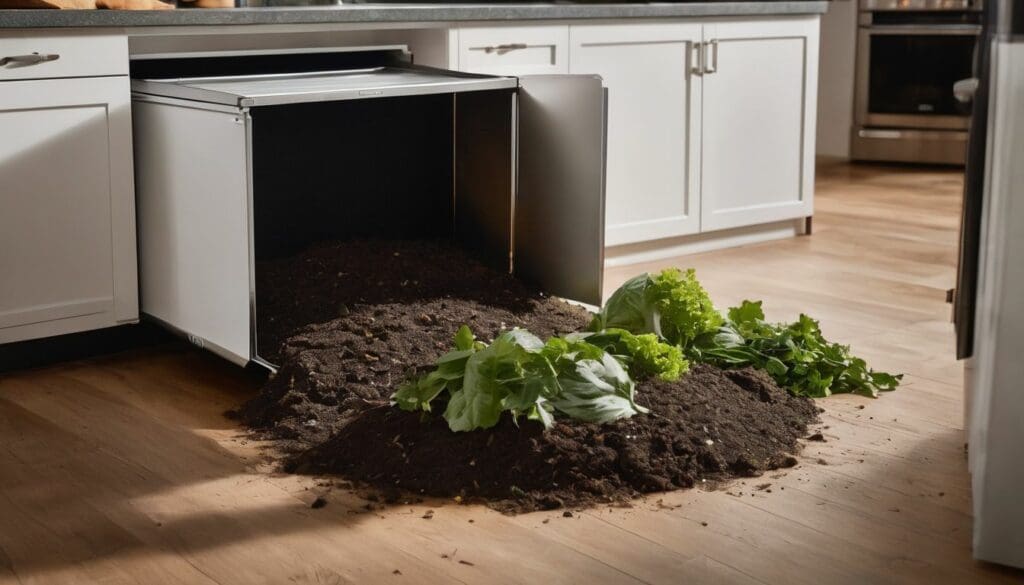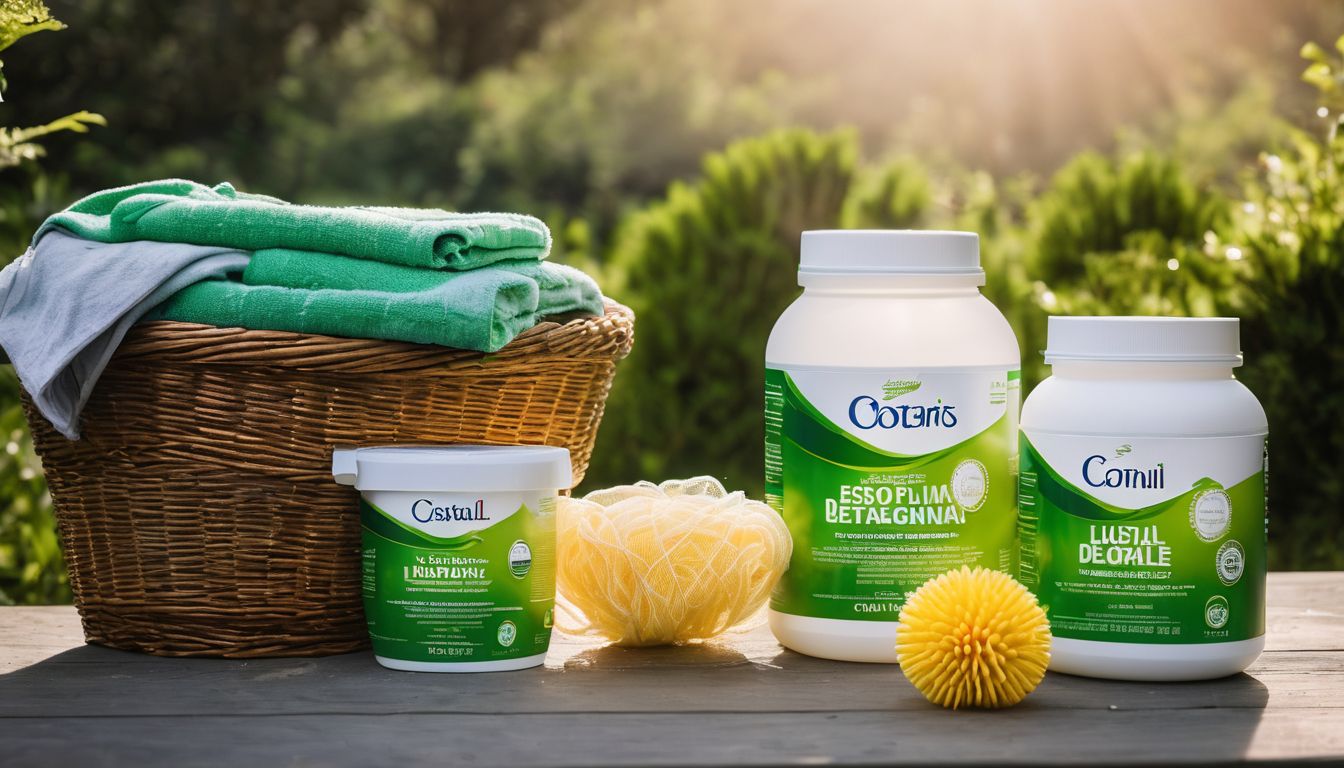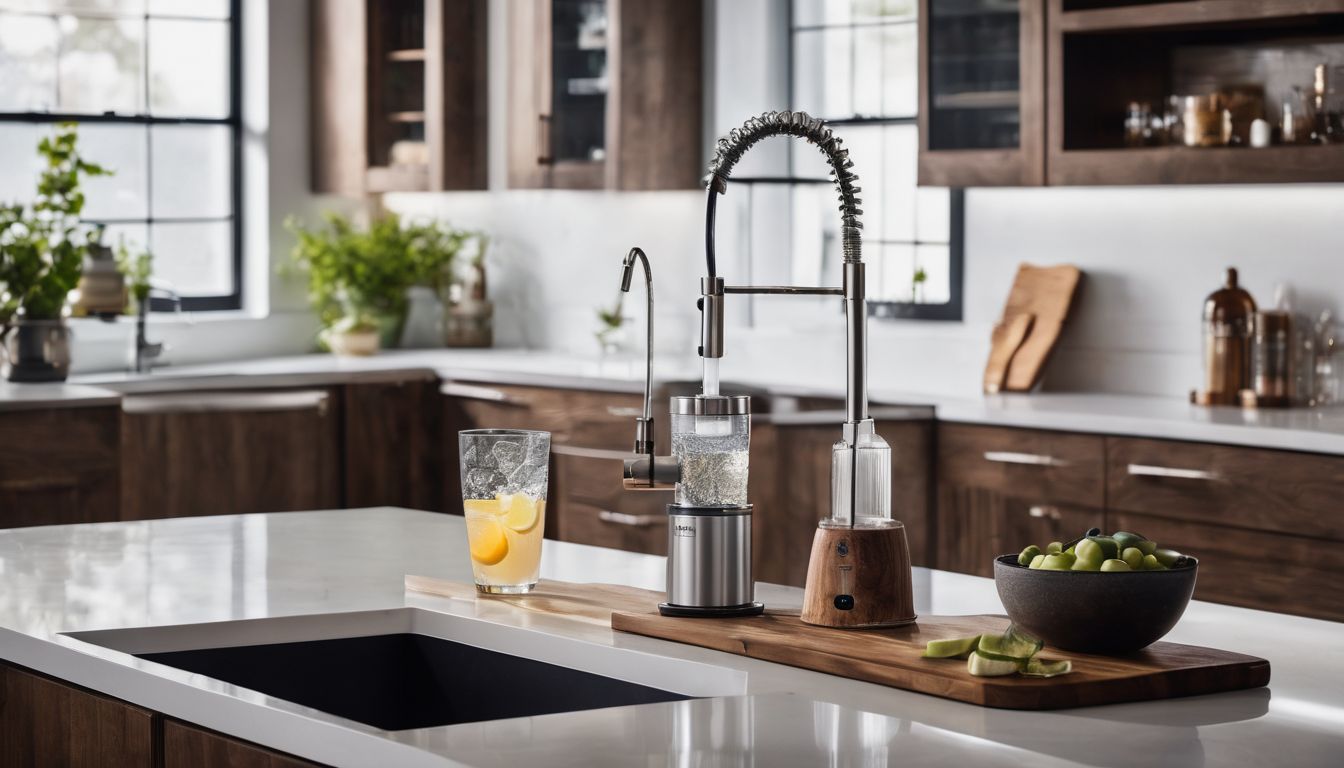Are you tired of watching your household bins overflow every week? Every year, each person in the UK generates about 400 kilograms of waste. Our guide will provide you with straightforward steps to manage your home’s waste more sustainably.
Read on for a greener tomorrow!
Key Takeaways
- Carry out a waste audit in your home to know what rubbish you throw away and where you can cut down.
- Sort your rubbish into degradable and non – degradable categories, using separate bins for each type, to help with recycling and composting efforts.
- Set up proper disposal units like recycling bins for paper, glass, and plastics, and consider starting a compost heap for food scraps and garden waste.
- Reduce the amount of stuff you need to throw away by reusing items like jars or clothes whenever possible, buying products with less packaging, and repairing things instead of replacing them.
- Learn how to safely dispose of hazardous waste such as batteries or electronics; never pour these substances down the drain.
Why Sustainable Waste Management is Important
Sustainable waste management plays a crucial role in preserving our planet for future generations. It reduces the strain on landfills and helps to cut down greenhouse gas emissions from decomposing waste.
This practice conserves precious resources by ensuring materials like glass, metal, and paper can be reused instead of being wasted. By managing waste responsibly, we take a significant step towards combating climate change and keeping our ecosystems healthy.
Dealing with rubbish in an eco-friendly manner also safeguards public health by minimising pollution in the air and water bodies. Communities that embrace sustainable practices enjoy cleaner environments as harmful chemicals and wastes are properly handled rather than indiscriminately dumped or burned.
Additionally, it paves the way for green living norms where each household contributes positively to environmental sustainability through actions like recycling, composting, and reducing their overall footprint.
Practical Tips for Sustainable Waste Management at Home
Conduct a waste audit to understand the types and amounts of waste your household produces, then segregate it into degradable and non-degradable waste for proper disposal. Use rubbish disposal units designed for eco-friendly waste management, promote waste reduction and reuse, and create a composting system for organic waste.
Conduct a waste audit
Start by evaluating your household’s waste production to understand the types and amounts of waste generated. Here’s how you can conduct a waste audit:
- Separate waste into categories such as paper, plastic, glass, metal, and organic waste.
- Measure the quantity of each type of waste produced over a specific period, e.g., a week or a month.
- Analyse the findings to identify areas where you can reduce waste and improve recycling practices.
- Implement changes based on the audit results to minimise household waste.
Segregate waste into degradable and non-degradable waste
Segregating waste into degradable and non-degradable categories helps in ecofriendly waste management. By doing this, you can reduce the overall environmental impact of your household waste. Ensure you follow these steps to effectively segregate your waste:
- Separate organic waste such as food scraps, yard trimmings, and paper products from non-organic materials like plastics, metal, and glass.
- Use separate bins or bags for each type of waste to make the segregation process easier.
- Label the containers clearly to avoid any confusion.
- Educate all household members about the importance of segregating waste to ensure everyone participates.
Use proper rubbish disposal units
Proper rubbish disposal units, such as recycling bins and composting bins, play a crucial role in sustainable waste management at home. They enable the segregation of degradable and non-degradable waste, making it easier to channel each type for appropriate processing.
By having designated disposal units for different types of waste, households can effectively contribute to waste reduction and reuse efforts by ensuring that recyclable materials are repurposed correctly while organic waste is diverted towards composting.
Efficiently using proper rubbish disposal units not only supports responsible waste handling but also promotes environment-friendly solutions that align with sustainable living practices.
Promote waste reduction and reuse
Encourage the reduction of waste by reusing items before discarding them. Emphasise the importance of finding new uses for items that would otherwise be thrown away. For example, consider repurposing glass jars as storage containers for food or other household items.
- Repurpose old clothes and fabrics by turning them into rags or reusable shopping bags.
- Avoid single – use plastic products and opt for reusable alternatives such as stainless steel straws and water bottles.
- Encourage mindful consumption by buying products with minimal packaging or in bulk to reduce waste.
- Share or donate items that are in good condition but no longer needed, instead of disposing of them.
- Repair and maintain household items to extend their lifespan rather than replacing them with new ones regularly.
- Educate others about the benefits of waste reduction and reuse through conversations, social media posts, or hosting informational events in your community.
Create a composting system
After promoting waste reduction and reuse, the next step is to create a composting system. Here’s how you can do it:
- Collect organic waste such as fruit and vegetable scraps, coffee grounds, eggshells, and garden trimmings in a designated container.
- Layer the organic waste with dry materials like leaves, straw, or shredded newspaper to maintain a good balance of carbon and nitrogen.
- Turn the compost regularly to aerate it and speed up the decomposition process.
- Keep the compost moist by adding water when necessary, ensuring it’s not too wet or too dry.
- Once the compost has turned dark and crumbly with an earthy smell, it’s ready to use in your garden as a natural fertiliser.
Benefits of Recycling
Recycling reduces the amount of waste in landfill, conserves natural resources, and reduces pollution. It plays a vital role in sustainable waste management at home.
Reduces the amount of waste in landfill
Recycling reduces waste in landfill, preserving valuable space and decreasing the environmental impact of household waste. By sorting and recycling materials like paper, glass, and plastic, we can divert significant quantities of recyclable items from ending up in landfills.
This process helps to extend the lifespan of existing landfill sites while also reducing the need for new ones. Recycling is a practical way for individuals to contribute to sustainable waste management at home, ensuring that less waste ends up buried in the ground.
The reduction of waste in landfill through recycling is crucial for minimising the negative effects on local environments and natural habitats. By actively participating in household recycling initiatives, we contribute to conserving resources and protecting ecosystems from pollution due to overflowing landfills.
Conserves natural resources
By reducing the amount of waste in landfills, sustainable waste management conserves natural resources. Through recycling and composting, valuable materials such as paper, plastic, glass, and organic matter are reused and transformed into new products.
This process minimises the need for raw materials extraction and production, helping to preserve forests, reduce energy consumption, and lower greenhouse gas emissions. Additionally, by segregating degradable waste for composting at home instead of sending it to landfills with other household waste items, individuals actively contribute to preserving natural resources.
Reduces pollution
Recycling reduces pollution by decreasing the need for raw materials, which in turn minimises industrial processes that produce harmful emissions. By reusing materials, less energy is required to manufacture new products, resulting in a reduced carbon footprint and lower air and water pollution levels.
Composting organic waste also reduces pollution by diverting it from landfills where it would generate methane, a potent greenhouse gas. Moreover, sustainable waste management at home through proper segregation and disposal methods contributes to cleaner air and water, benefiting both human health and the environment.
Hazardous Waste Management
Proper disposal of hazardous waste and identifying and avoiding hazardous waste at home are crucial for the safety and health of both humans and the environment. Read on to learn more about sustainable waste management in homes.
Proper disposal of hazardous waste
Disposing of hazardous waste is crucial for maintaining a safe and healthy environment. It involves handling, storing, and disposing of any materials that can pose a threat to health or the environment if not managed properly. Here’s how to do it right:
- Identify hazardous waste: Know what items qualify as hazardous waste in your home, such as batteries, paint, pesticides, and electronic devices.
- Store hazardous waste safely: Keep these items separate from regular household rubbish and store them in their original containers or in clearly labelled ones.
- Find local disposal options: Research local facilities that accept hazardous waste for proper disposal; some municipalities offer collection events.
- Do not pour down drains or wash into the soil: Never dispose of hazardous waste by pouring it down sinks, toilets, or storm drains – this can contaminate water sources.
- Seek professional help when uncertain: If you are unsure about how to manage a specific type of hazardous waste, seek advice from professionals or local authorities.
Identifying and avoiding hazardous waste
- Read product labels carefully to identify hazardous ingredients and follow proper disposal instructions.
- Avoid purchasing products with toxic chemicals, such as bleach or ammonia, whenever possible.
- Use natural alternatives for household cleaning, such as vinegar and bicarbonate of soda, to minimise the use of harmful substances.
- Check local regulations for guidance on disposing of items like batteries, fluorescent bulbs, and old electronics.
- Store potentially hazardous materials securely in well – marked containers to prevent accidental exposure or spills.
Conclusion
By implementing sustainable waste management practices at home, we can reduce our environmental impact. Segregating waste and promoting recycling are simple yet effective ways to contribute to a cleaner planet.
Creating a composting system can turn organic waste into valuable resources for our gardens. Adopting these eco-friendly methods ensures that we play an active role in conserving natural resources and reducing pollution.
Taking small steps towards sustainable waste management in homes can make a big difference in the long run.
FAQs
1. What is sustainable waste management in homes?
Sustainable waste management in homes focuses on eco-friendly methods to reduce, handle, and dispose of household waste with an aim for resource conservation.
2. How can we manage solid waste at home effectively?
You can effectively manage solid waste at home by practising good habits such as segregating your rubbish into nondegradable and organic categories and reducing everyday household waste.
3. Are there environmentally friendly solutions for nondegradable waste?
Yes, for nondegradable wastes like plastics and metals, you should use eco-friendly disposal options like recycling programmes or specialised sustainable bins.
4. What benefits come from separating green waste management from other types?
When you segregate green or organic wastes from others, it makes it easier to turn them into compost which supports a healthier environment through better soil quality without adding to the landfill.
5. Why should I care about eco-friendly rubbish disposal in my home?
Caring about eco-friendly rubbish disposal helps minimise pollution, protect wildlife habitats, save energy and ensures that natural resources are preserved for future generations.





